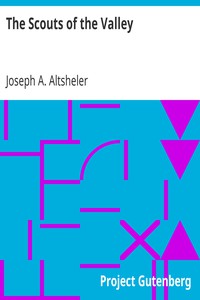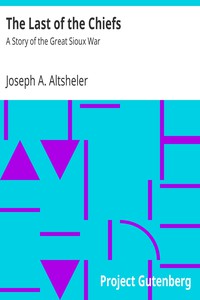The Scouts of the Valley by Joseph A. Altsheler (snow like ashes series .TXT) 📗

- Author: Joseph A. Altsheler
Book online «The Scouts of the Valley by Joseph A. Altsheler (snow like ashes series .TXT) 📗». Author Joseph A. Altsheler
The whole force was re-embarked upon the Susquehanna, and it was still full of the impulse of savage triumph. Wild Indian songs floated along the stream or through the meadows, which were quiet now. They advanced at their ease, knowing that there was nobody to attack them, but they were watched by five woodsmen, two of whom were boys. Meanwhile the story of Wyoming, to an extent that neither Indians nor woodsmen themselves suspected, was spreading from town to town in the East, to invade thence the whole civilized world, and to stir up an indignation and horror that would make the name Wyoming long memorable. Wyoming had been a victory for the flag under which the invaders fought, but it sadly tarnished the cause of that flag, and the consequences were to be seen soon.
Henry Ware, Paul Cotter, Sol Hyde, Tom Ross, and Jim Hart were thinking little of distant consequences, but they were eager for the present punishment of these men who had committed so much cruelty. From the bushes they could easily follow the canoes, and could recognize some of their occupants. In one of the rear boats sat Braxton Wyatt and a young man whom they knew to be Walter Butler, a pallid young man, animated by the most savage ferocity against the patriots. He and Wyatt seemed to be on the best of terms, and faint echoes of their laughter came to the five who were watching among the bushes on the river bank. Certainly Braxton Wyatt and he were a pair well met.
“Henry,” said Shif'less Sol longingly, “I think I could jest about reach Braxton Wyatt with a bullet from here. I ain't over fond o' shootin' from ambush, but I done got over all scruples so fur ez he's concerned. Jest one bullet, one little bullet, Henry, an' ef I miss I won't ask fur a second chance.”
“No, Sol, it won't do,” said Henry. “They'd get off to hunt us. The whole fleet would be stopped, and we want 'em to go on as fast as possible.”
“I s'pose you're right, Henry,” said the shiftless one sadly, “but I'd jest like to try it once. I'd give a month's good huntin' for that single trial.”
After watching the British-Indian fleet passing up the river, they turned back to the site of the Wyoming fort and the houses near it. Here everything had been destroyed. It was about dusk when they approached the battlefield, and they heard a dreadful howling, chiefly that of wolves.
“I think we'd better turn away,” said Henry. “We couldn't do anything with so many.”
They agreed with him, and, going back, followed the Indians up the Susquehanna. A light rain fell that night, but they slept under a little shed, once attached to a house which had been destroyed by fire. In some way the shed had escaped the flames, and it now came into timely use. The five, cunning in forest practice, drew up brush on the sides, and half-burned timber also, and, spreading their blankets on ashes which had not long been cold, lay well sheltered from the drizzling rain, although they did not sleep for a long time.
It was the hottest period of the year in America, but the night had come on cool, and the rain made it cooler. The five, profiting by experience, often carried with them two light blankets instead of one heavy one. With one blanket beneath the body they could keep warmer in case the weather was cold.
Now they lay in a row against the standing wall of the old outhouse, protected by a six- or seven-foot slant of board roof. They had eaten of a deer that they had shot in the morning, and they had a sense of comfort and rest that none of them had known before in many days. Henry's feelings were much like those that he had experienced when he lay in the bushes in the little canoe, wrapped up from the storm and hidden from the Iroquois. But here there was an important increase of pleasure, the pattering of the rain on the board roof, a pleasant, soothing sound to which millions of boys, many of them afterwards great men, have listened in America.
It grew very dark about them, and the pleasant patter, almost musical in its rhythm, kept up. Not much wind was blowing, and it, too, was melodious. Henry lay with his head on a little heap of ashes, which was covered by his under blanket, and, for the first time since he had brought the warning to Wyoming, he was free from all feeling of danger. The picture itself of the battle, the defeat, the massacre, the torture, and of the savage Queen Esther cleaving the heads of the captives, was at times as vivid as ever, and perhaps would always return now and then in its original true colors, but the periods between, when youth, hope, and strength had their way, grew longer and longer.
Now Henry's eyelids sank lower and lower. Physical comfort and the presence of his comrades caused a deep satisfaction that permeated his whole being. The light wind mingled pleasantly with the soft summer rain. The sound of the two grew strangely melodious, almost piercingly sweet, and then it seemed to be human. They sang together, the wind and rain, among the leaves, and the note that reached his heart, rather than his ear, thrilled him with courage and hope. Once more the invisible voice that had upborne him in the great valley of the Ohio told him, even here in the ruined valley of Wyoming, that what was lost would be regained. The chords ended, and the echoes, amazingly clear, floated far away in the darkness and rain. Henry roused himself, and came from the imaginative borderland. He stirred a little, and said in a quiet voice to Shif'less Sol:
“Did you hear anything, Sol?”
“Nothin' but the wind an' the rain.”
Henry knew that such would be the answer.
“I guess you didn't hear anything either, Henry,” continued the shiftless one, “'cause it looked to me that you wuz 'bout ez near sleep ez a feller could be without bein' ackshooally so.”
“I was drifting away,” said Henry.
He was beginning to realize that he had a great power, or rather gift. Paul was the sensitive, imaginative boy, seeing everything in brilliant colors, a great builder of castles, not all of air, but Henry's gift went deeper. It was the power to evoke the actual living picture of the event that bad not yet occurred, something akin in its nature to prophecy, based perhaps upon the wonderful power of observation, inherited doubtless, from countless primitive ancestors. The finest product of the wilderness, he saw in





Comments (0)